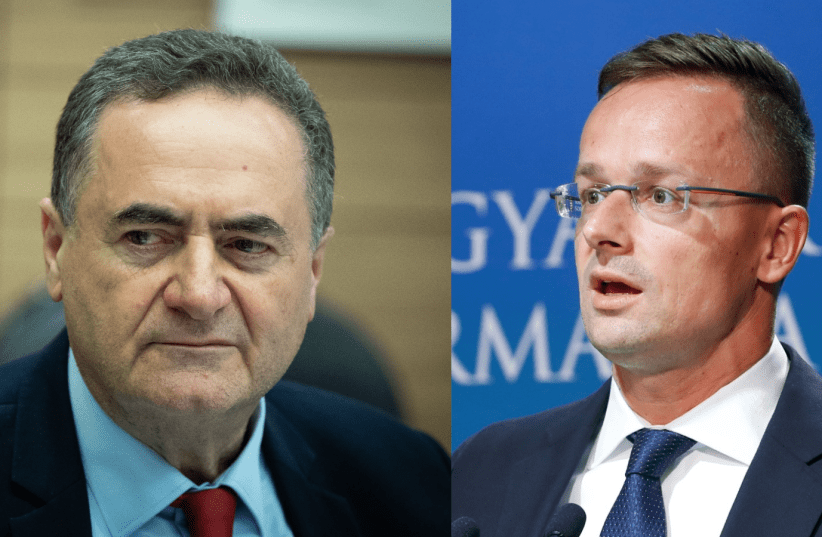The Post learned that Foreign Minister Israel Katz, who was at the Munich Security Conference, had personally called his Hungarian counterpart Péter Szijjártó and asked that he help Israel.
FEBRUARY 19, 2024 22:37 Updated: FEBRUARY 19, 2024 23:29
(photo credit: REUTERS/BERNADETT SZABO, YONATAN SINDEL/FLASH90)Hungary has twice blocked a European Union consensus statement against the IDF’s pending military operation against Hamas in Rafah in the southern Gaza Strip, a consensus that called for an “immediate humanitarian pause” to the war, leading to a permanent ceasefire, The Jerusalem Post has learned.
“Hungary stood alone in the EU,” senior diplomatic sources said.
EU foreign policy chief Josep Borrell had twice attempted to issue a consensus statement with the support of all 27 member states of the bloc.
He first tried to issue such a statement on the sideline of the Munich Security Conference in Berlin over the weekend and again during a meeting of foreign ministers in Brussels on Monday.
European Union High Representative for Foreign Affairs and Security Policy Josep Borrell rings a bell to start a meeting of EU defense ministers, in Brussels, last month. (credit: YVES HERMAN/REUTERS)
FM Katz asked Hungarian counterpart to help Israel
The Post has learned that Foreign Minister Israel Katz, who was at the Munich Security Conference, had personally called Hungarian Foreign Minister Péter Szijjártó and asked that he help Israel block the statement.
According to senior diplomatic sources, Szijjártó then called Katz back to assure him that Hungary had backed Israel, explaining that he had “prevented it.” Katz then updated Prime Minister Benjamin Netanyahu.
The content of the stamens would have been “dramatic” and could have caused “severe damage” by looking to prevent the “option and possibility of [IDF] action in Gaza,” the diplomatic sources said.
The sources added that the EU has been more emboldened to take steps against Israel in light of public US criticism toward Jerusalem.
Speaking to reporters after the meeting Monday, Borrell explained that he had received the support of 26 member states for the statement but did not name the member state that opposed it.
Still, he said, the backing of 26 EU members out of 27 is significant.
“I know that if there is not unanimity, then there is not an EU position,” Borrell said.
“But there can be a position that is based on a big majority, and without being a formal EU position, it is nonetheless a majority position. And 26 out of 27 is indeed a majority position,” Borrell stated.
Those 26 member states “are asking for an immediate humanitarian pause [to the war]. That means a halt in military operations, an immediate pause that would lead to a sustainable ceasefire,” Borrell said.
“That is as much as we could get, but I think it is significant,” Borrell said, given how dramatic the situation is.
The international community has been concerned about Rafah, given that there are 1.3 million Palestinians there, many of whom fled to that area to escape bombing in northern Gaza.
Israel has insisted that it must be allowed to destroy Hamas’s last stronghold, which is Rafah, or it would be impossible to defeat the terror group.
The statement approved by the 26 EU states asked the IDF not to “take military action in Rafah that would worsen an already catastrophic humanitarian situation and prevent the urgently needed provision of basic services and humanitarian assistance.”
Borrell also reported that the EU lacked consensus to adopt sanctions against West Bank settlers who have acted violently against innocent Palestinians, again failing to name the countries that objected.
The Post has also learned that Hungary objected to the issuance of such sanctions.
Content retrieved from: https://www.jpost.com/international/article-787822.
